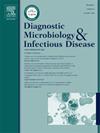Anti-NMDA receptor encephalitis following SARS-CoV-2 infection in children
IF 1.8
4区 医学
Q3 INFECTIOUS DISEASES
Diagnostic microbiology and infectious disease
Pub Date : 2025-07-26
DOI:10.1016/j.diagmicrobio.2025.117028
引用次数: 0
Abstract
Background
The purpose of this study was to report the phenomenon of anti-N-methyl-d-aspartate (anti-NMDA) receptor encephalitis following novel coronavirus disease 2019 (COVID-19), to minimize misdiagnoses of this as post-COVID-19 syndrome, and to promote early identification, enabling these patients to benefit from early immunotherapy.
Methods
The study included three pediatric patients with anti-NMDA receptor encephalitis following COVID-19, treated at our hospital from July to September 2023. We collected and analyzed the clinical data from these patients, including background information, clinical presentations, laboratory examination results, imaging results, electrophysiological results, treatment, and prognosis.
Results
Three patients presented with varying degrees of nonspecific symptoms, including recurrent dizziness, headache, and/or sleep disturbance, after severe acute respiratory syndrome coronavirus 2 (SARS-CoV-2) infection, initially considered as post-COVID-19 syndrome. After 2 months, 3 months, and 5 months, they developed seizures, speech disturbance, motor abnormalities, mood abnormalities, and other neuropsychiatric symptoms, with elevated cerebrospinal fluid monocytes, positive cerebrospinal fluid SARS-CoV-2-IgG, and anti-NMDAR-IgG. They were diagnosed with anti-NMDA receptor encephalitis following novel coronavirus disease. They were treated with intravenous immunoglobulin and corticosteroids, and each made a general recovery.
Conclusion
SARS-CoV-2 virus infection may be a trigger for the development of anti-NMDAR encephalitis. When neurological symptoms (even some nonspecific symptoms) are present following SARS-CoV-2 virus infection, neuroantibody assays are warranted to enable such patients to reap the potential benefits of early immunotherapy treatment.
儿童SARS-CoV-2感染后抗nmda受体脑炎
本研究旨在报道新型冠状病毒病2019 (COVID-19)后抗n -甲基-d-天冬氨酸(anti-NMDA)受体脑炎的现象,以减少其误诊为后COVID-19综合征,并促进早期发现,使这些患者受益于早期免疫治疗。方法研究于2023年7月至9月在我院收治的3例小儿COVID-19后抗nmda受体脑炎患者。我们收集并分析了这些患者的临床资料,包括背景资料、临床表现、实验室检查结果、影像学结果、电生理结果、治疗和预后。结果3例患者感染严重急性呼吸综合征冠状病毒2 (SARS-CoV-2)后出现不同程度的非特异性症状,包括反复出现头晕、头痛和/或睡眠障碍,初步考虑为后冠状病毒综合征。2个月、3个月和5个月后,患者出现癫痫发作、言语障碍、运动异常、情绪异常和其他神经精神症状,脑脊液单核细胞升高,脑脊液SARS-CoV-2-IgG和抗nmdar - igg阳性。诊断为新型冠状病毒感染后的抗nmda受体脑炎。他们接受了静脉注射免疫球蛋白和皮质类固醇的治疗,每个人都得到了一般的恢复。结论sars - cov -2病毒感染可能是抗nmdar脑炎发生的一个触发因素。当SARS-CoV-2病毒感染后出现神经系统症状(甚至一些非特异性症状)时,有必要进行神经抗体检测,以使此类患者能够获得早期免疫治疗的潜在益处。
本文章由计算机程序翻译,如有差异,请以英文原文为准。
求助全文
约1分钟内获得全文
求助全文
来源期刊
CiteScore
5.30
自引率
3.40%
发文量
149
审稿时长
56 days
期刊介绍:
Diagnostic Microbiology and Infectious Disease keeps you informed of the latest developments in clinical microbiology and the diagnosis and treatment of infectious diseases. Packed with rigorously peer-reviewed articles and studies in bacteriology, immunology, immunoserology, infectious diseases, mycology, parasitology, and virology, the journal examines new procedures, unusual cases, controversial issues, and important new literature. Diagnostic Microbiology and Infectious Disease distinguished independent editorial board, consisting of experts from many medical specialties, ensures you extensive and authoritative coverage.

 求助内容:
求助内容: 应助结果提醒方式:
应助结果提醒方式:


